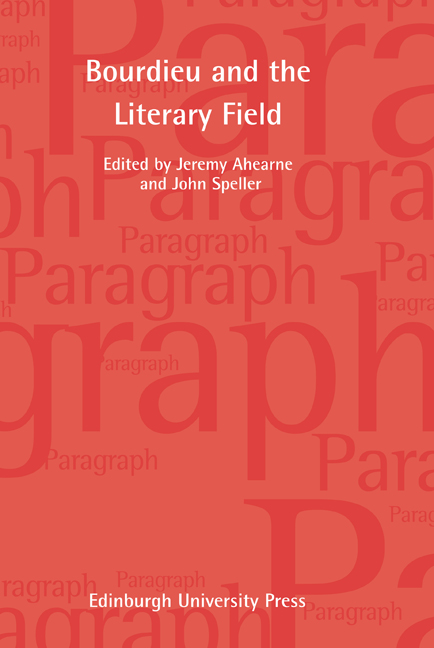Book contents
- Frontmatter
- Contents
- Introduction: Bourdieu and the Literary Field
- How Field Theory Can Contribute to Knowledge of World Literary Space
- Autonomy Revisited: The Question of Mediations and its Methodological Implications
- The Literary Field and the Field of Power: The Case of Modern China
- Between Repression and Anamnesis: Pierre Bourdieu and the Vicissitudes of Literary Form
- Reading and Reflexivity: Bourdieu’s Faulkner
- Fields and Fragments: Bourdieu, Pascal and the Teachings of Literature
- On an Enigmatic Text by Pierre Bourdieu
- Apollinaire, Autumn Ill
- Notes on Contributors
Introduction: Bourdieu and the Literary Field
Published online by Cambridge University Press: 17 September 2020
- Frontmatter
- Contents
- Introduction: Bourdieu and the Literary Field
- How Field Theory Can Contribute to Knowledge of World Literary Space
- Autonomy Revisited: The Question of Mediations and its Methodological Implications
- The Literary Field and the Field of Power: The Case of Modern China
- Between Repression and Anamnesis: Pierre Bourdieu and the Vicissitudes of Literary Form
- Reading and Reflexivity: Bourdieu’s Faulkner
- Fields and Fragments: Bourdieu, Pascal and the Teachings of Literature
- On an Enigmatic Text by Pierre Bourdieu
- Apollinaire, Autumn Ill
- Notes on Contributors
Summary
Pierre Bourdieu's range as a thinker was extremely wide, and it would be misleading to present him primarily as a literary theorist. Trained as a philosopher, he became the leading French sociologist of his generation, and brought under the spotlight of his ‘critical sociology‘ a whole series of institutional and discursive universes (education, art, linguistics, public administration, politics, philosophy, journalism, economics and others). Far from representing an intellectual dispersal, these manifold objects of enquiry allowed him to develop and refine a comprehensive theory of social process and power-relations based on distinctive concepts such as ‘field’, ‘habitus’, variously conceived notions of ‘capital’, and ‘illusio’ (all these concepts and others will be explicated and assessed in this issue). Yet Bourdieu's analyses were scarcely ever received as neutral descriptions within the fields which he analysed. Bourdieu's abiding agenda was to show how the discursive presuppositions and institutional logics at work in such fields carried but also masked certain social logics that a ‘critical sociology’ could disclose. Coupled with the inveterately combative drive seldom absent from Bourdieu's objectifying analyses—and even setting aside the misprisions to which an external analyst is inevitably subject— this helps explain the resistance which his work recurrently provoked. In this respect, Bourdieu's forays into the world of literary studies and his reception therein can be seen as part of a wider pattern.
When it appeared in 1992, The Rules of Art was perceived by many to represent, at worst, an all-out attack on approaches to literature in the academy, or, at best, a comprehensive endeavour to annex literary study under an all-embracing sociology.To some degree, this resistance simply reactivated an older hostility among literary scholars to the ‘reductionism’ of sociology. This was unfortunate, insofar as Bourdieu's theory of literary autonomy takes shape precisely in reaction to such traditional sociological reductionism. The concern about annexation does respond to a certain scientific imperialism that often emanates from Bourdieu's writing, and this will be addressed by a number of contributors to the present special issue. At the same time, however, the refusal to engage with Bourdieu's work on these grounds is also unfortunate. As several contributors also show, the coordinated analysis of literary worlds—including the worlds of literary form— as relationally constructed social ‘fields’, with their diverse forms of ‘habitus’, ‘capital’ and ‘illusio’, can generate significant insight into those worlds.
- Type
- Chapter
- Information
- Bourdieu and the Literary FieldParagraph Volume 35, Number 1, pp. 1 - 9Publisher: Edinburgh University PressPrint publication year: 2020



